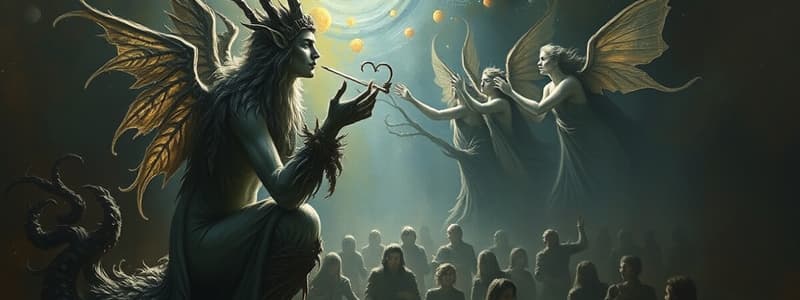Podcast
Questions and Answers
Which statement best reflects Matthew Arnold's perspective on culture?
Which statement best reflects Matthew Arnold's perspective on culture?
- Culture includes only the highest achievements recognized by the elite. (correct)
- Culture is defined as the collective efforts of the working class.
- Culture is merely the popular trends seen in society.
- Culture should evolve constantly with popular opinion.
What major concern did Matthew Arnold express regarding the involvement of the working class in politics?
What major concern did Matthew Arnold express regarding the involvement of the working class in politics?
- He felt it would enrich political discourse.
- He thought it might cause a collapse of cultural standards. (correct)
- He believed it would lead to greater democratic representation.
- He was indifferent to the impact on culture.
Which example is NOT associated with South Korea's cultural contributions?
Which example is NOT associated with South Korea's cultural contributions?
- K-Drama
- K-Pop
- Samsung
- The Body Shop (correct)
How has Arnold's perspective on culture evolved in modern studies?
How has Arnold's perspective on culture evolved in modern studies?
What is one of the primary contributions of the United States to popular culture?
What is one of the primary contributions of the United States to popular culture?
Which opera was composed by Wolfgang Amadeus Mozart based on a libretto by Emanuel Schikaneder?
Which opera was composed by Wolfgang Amadeus Mozart based on a libretto by Emanuel Schikaneder?
What is a key distinction between high culture and popular culture?
What is a key distinction between high culture and popular culture?
Which poet wrote 'Gitanjali' and is recognized as a significant cultural contributor of India?
Which poet wrote 'Gitanjali' and is recognized as a significant cultural contributor of India?
Which composition by Lucresia Kasilag incorporates Philippine folk musical instruments?
Which composition by Lucresia Kasilag incorporates Philippine folk musical instruments?
What defines popular culture?
What defines popular culture?
Flashcards are hidden until you start studying
Study Notes
Defining Culture
- Matthew Arnold (1869) defined culture as "the best that has been thought and said in the world".
- Arnold feared cultural collapse due to the working class's political involvement, suggesting an elitist view of culture.
- Recognizing diverse contributions to culture:
- Japan: J-Pop, anime, vibrant advertising
- UK: The Beatles, Doctor Who, Mr. Bean
- US: Elvis Presley, Marvel Cinematic Universe, Coen Brothers
- South Korea: K-Pop, K-Drama
The Spectrum of Culture
- Culture spans a spectrum:
- High culture: Intellectual, sophisticated aspects.
- Folk culture: Exclusive and stable, shared initially within groups.
- Popular culture: Middle ground, blending elements from high and folk cultures.
- Example of folk culture components includes regional music, dances, and rituals.
Defining Popular Culture
- Popular culture (pop culture) is accessible culture favored by the general populace.
- Defined by John Storey in various ways:
- Widely liked, with no inherent negative connotations.
- Seen as inferior when contrasted with high culture, marking class distinctions.
- Represents commercial objects produced for mass consumption.
- Emerges from the people, as opposed to being imposed by elites.
- Negotiated between dominant and subordinate classes, shaping cultural trends.
- Blurs distinction between "authentic" and "commercial" in postmodern contexts.
Youth Culture
- Youth culture reflects dynamic historical processes and influences cultural stability.
- Youth, especially teenagers, drive cultural shifts during their identity formation.
- Soul-searching by the youth affects cultural dynamics, distinguishing their development from that of adults.
Studying That Suits You
Use AI to generate personalized quizzes and flashcards to suit your learning preferences.





